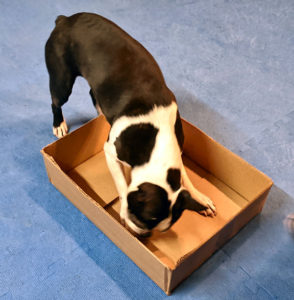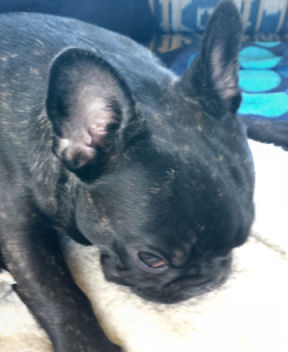Trouble maker dogs are the ones you want. Most people tend to think that dog trainers’ dogs are model citizens. Polite, well-behaved, little robots with four legs. It’s a lie. Most of the dog trainers we know, including us, have naughty dogs. Trouble makers are our favorites. Both in our own dogs, and in our training classes.
The reason’s simple. Smart dogs cause way more trouble than stupid ones. They’re problem-solvers who create chaos trying to get what they want. They figure stuff out. That’s why they’re so much fun.
All positive-reinforcement trainers know that once dogs understand how to learn, they can do it at rapid-fire pace. The hardest part, when you have a dog who loves playing training games, is coming up with new games/tricks to teach.
Challenge your trouble maker dog
There are lots of ways to measure dog intelligence. The breed most-often touted as brilliant is the Border Collie. There’s no question they’re highly trainable, motivated-to-work dogs. But measured with different criteria, like independent action, or problem solving, they’re not the top prospects.
It makes sense. Dog breeds were developed to do certain jobs. Some breeds excel at working closely with and being directed by people. Other breeds, like terriers, work independently since their job was to catch vermin. Most small dogs have at least a bit of terrier in them – that’s why they get a reputation (we think undeserved) for being stubborn. Playing training games with you has to be more interesting than whatever else is around.
Luckily, that’s not hard. Small dogs tend to catch on quickly, especially when ample treats are involved. There are few dogs who can resist the temptation of cheese!
So much fun
This post is a big, fat commercial to try to get you to start playing training games with your dog. The first game we’re recommending is “Boxey!” and there’s no excuse for you not to try it with your dog. All you need to play is a box big enough for your dog to sit in, short enough for them to get in, and some treats. This game will clue you in on how creative your dog can be.
It can also show you that your dog is dependent on you for instructions. The whole point of this game is to expand your dog’s horizons. If you think your dog is sometimes bored, this cures it. They get to try new stuff, have your complete attention, and get lots of treats. Playing training games with you is probably as close to dog paradise as you can get.
Don’t get discouraged
If your dog, like many, has been told what to do all its life, it may take a while for them to understand they can make decisions on their own. Granted, once they catch on, they’ll be even more trouble than they were before. They’ll also understand more of the rules of the house, make better decisions more of the time, and be more responsive to what you want them to do.
Dogs are capable of understanding hundreds of words. They just need us to teach them. If you’re skeptical, start small. Teach your dog “Off!” Grow your dog’s vocabulary, and build a better partnership at the same time.
Once you start with training games, you’ll enjoy your dog even more. If that’s possible. And you’ll come to appreciate your trouble maker dogs, too.
Enjoyed this post? Click here to sign up for the weekly newsletter and never miss another!











 t! Scientists are now finding that dogs can learn hundreds of words, know their owners apart from anyone else, are happy to see us, get jealous when we pay attention to other dogs, and can follow our gazes as well as our gestures. Read all about it
t! Scientists are now finding that dogs can learn hundreds of words, know their owners apart from anyone else, are happy to see us, get jealous when we pay attention to other dogs, and can follow our gazes as well as our gestures. Read all about it